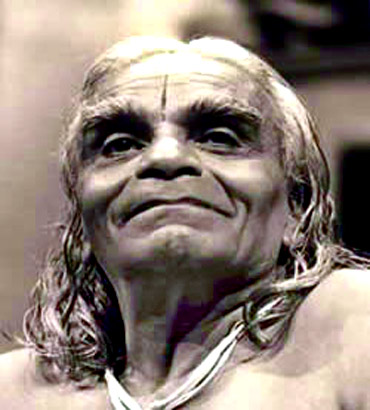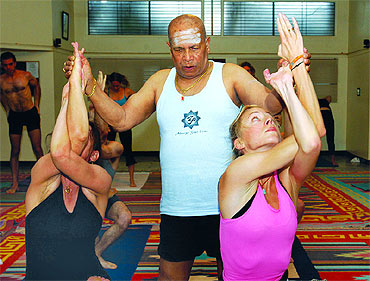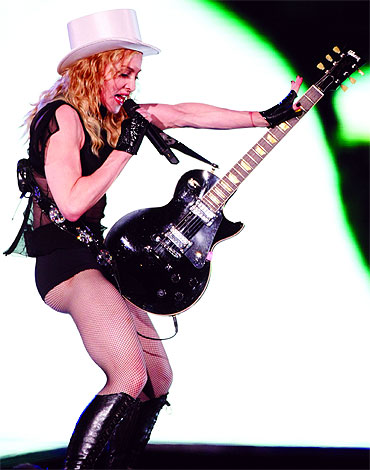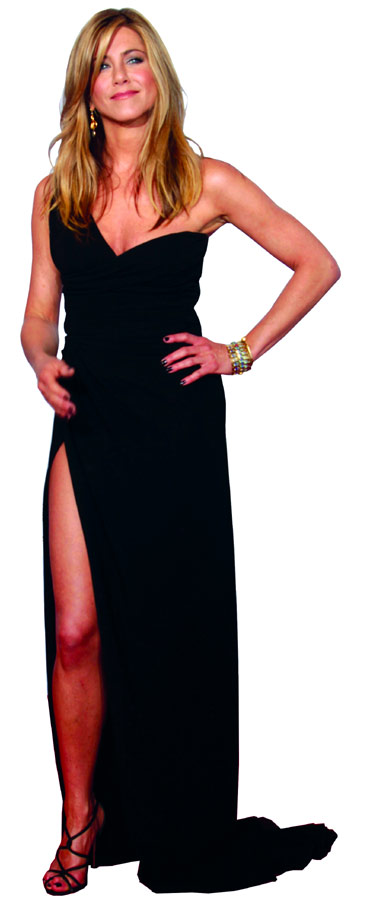
If you thought Swami Vivekananda was the first one to suggest yoga to Americans, think again, says Arthur J Pais
Stefanie Syman, a journalist and yoga aficionado for over 15 years, asserted in her book The Subtle Body: The Story of Yoga in America that yoga 'has been the aspect of Asian culture most widely and readily assimilated' in the United States, outside of food.
Syman named Henry David Thoreau as one of the earliest American yogis. Vivekananda came to America in 1893 to address the World Parliament of Religions in Chicago. Thoreau was a big influence on Mahatma Gandhi's Civil Disobedience campaign against the British.
Thoreau would often meditate from sunrise to noon, and once wrote in a letter, Syman pointed out in her book published a few months ago, 'To some extent, and at rare intervals, I even am a Yogin.'
Thoreau, his friend Ralph Waldo Emerson and other Transcendentalists in 19th century Concord, Massachusetts, had enormous interest in Hinduism. Emerson in his long poem Brahma glanced at Vedantic Hinduism through translations of Hindu epics.
Yoga and Indian meditation caught the imagination of millions of Americans starting four decades ago, thanks to the efforts of yoga masters and writers B K S Iyengar and Pattabhi Jois and yoga's popularity with Hollywood and British glitterati including Madonna, Sting, George Harrison, Christy Turlington and writers like Allen Ginsberg and Christopher Isherwood.
Yoga continues to win over more and more Americans year after year. Though many Hollywood celebrities in the 1930s and 1940s were curious about yoga and Vedanta thanks to Swami Yogananda Paramahamsa, yoga and meditation did not really start catching fire till the 1960s.
Syman reveals that one of the first prolific American yogis was Pierre Bernard, who brought tantric yoga into the secret-society culture in America at the turn of the 20th century. He founded the ultra-exclusive Tantrik Order in 1905 with the forbidding cost in those days, of $100 for a membership.
...

Bernard 'would don a dark velvet cape, pinned just below his neck, with the TO insignia -- a winged globe framed by a gold star of David -- itself encircled by a snake eating its own tail. In a photograph from this era, Bernard has a handlebar moustache and long sideburns,' Syman wrote.
In Yoga Body: The Origins of Modern Posture Practice, Mark Singleton wrote that Bernard first gained attention in 1898 when, witnessed by nearly 40 doctors and surgeons, he demonstrated Kali-Mudra, the simulation of death.
Syman describes a later photo of a similar event: 'Bernard's body is lax and blood dribbles out of his nose, as a physician, in black cutaway coat fingers his wrist, looking for but not finding his pulse. Bernard had used pranayam to slow his heartbeat to imperceptibility.'
Bernard was the subject of The Great Oom: The Improbable Birth of Yoga in America, published last year to acclaim. It is written by journalist Robert Love, who reveals that mid-west born Bernard original name Perry Baker began his teenage yoga studies under a Syrian-Indian teacher, Sylvais Hamati. Rumor has it Bernard traveled to India in the 1890s.
He went on to launch yoga schools on both coasts. The police often raided his classes, thanks to rumors that he had sex with underage girls. Researchers and yoga historians believe he was notorious for his sex rites and philandering, and that his legacy is primarily that of a conman.
'In New York City in 1910, his private clients included Broadway star Lillian Russell,' writes Love. 'But it was at his country ashram in Nyack, New York, that yoga became a cause c l bre for the boldfaced names of the Roaring Twenties.'
Russian-born Indra Devi brought glamour and yoga to America. 'Devi's near-immediate success in Los Angeles reads like some strange fairy tale: A virtually unknown middle-aged foreigner alights in the City of Angels to teach a relatively obscure type of yoga and is almost immediately patronized by the city's biggest stars,' Syman wrote.
'But there wasn't anything particularly unusual about the course of events. Devi had lived most of her life in the company of royalty of some sort and had the assuredness of wealth, though she had long since dispensed with its outward manifestations.'
Married to a Czech diplomat, Devi learned yoga in Mysore from Sri Krishnamacharya, who also taught B K S Iyengar and Pattabhi Jois. Krishnamacharya had refused to teach Devi because she was a woman, but he changed his mind at the request of the Mysore raja.
...

The stories of Americans adopting yoga and showing interest in Hinduism were big news in the 1920s. 'Daughter of Wilson Turns Hindu' The Washington Post headline said in response to news that Margaret Woodrow Wilson left America for an ashram in India, Syman revealed.
Her death in 1944 was greeted with The New York Times headline: 'Margaret Woodrow Wilson Dies a Recluse at 57 in a Religious Colony in India.'
Early celebrity adopters of yoga included Gloria Swanson, Linda Christian and Ruth St Denis, all Devi's devotees in Los Angeles. Years later, Shirley MacLaine would openly declare her belief in reincarnation. Goldie Hawn shared her fascination with Buddhism and Hinduism.
The age of the guru reached its height in the 1960s, yoga historians say, thanks to the counter culture movement in America, and many gurus including Swami Satchidananda settling down in America or spending months here and in Europe.
Other gurus like Swami Muktananda, who counted many Hollywood celebrities among his disciples, also made yoga highly visible in the 1970s and 1980s.
...
The author of many books on yoga and a popular figure at the 1969 Woodstock festival, Satchidananda 'led the high, young multitude in chanting Sanskrit syllables,' Syman wrote.
'Tens of thousands of Americans dove headlong into a spiritualised yoga the kind that took over your whole life, the kind that made you drop everything to follow your guru around, the kind that got you to India, no money in your pocket and you don't even care.'
Yoga was also catching up as physical therapy in a big way starting in the 1980s. One reason for its wide appeal, Syman -- who also reveal the shortcomings of many yoga teachers -- mused, is because 'yoga is so massive and complicated It is so contradictory and baroque that American society has been able to assimilate any number of versions of it, more or less simultaneously.'
Yoga has also become 'one of the first and most successful products of globalisation,' she asserted.Robert Love said he knows why so many Hollywood artists are drawn to yoga. 'The real reason artists do it and then talk about it is that yoga works,' he wrote in an essay.
'Look at the long careers of Madge and Sting; it seems obvious that they're doing something right. So when Jennifer Aniston wants you to believe that yoga changed her life, there's no reason to doubt her.'